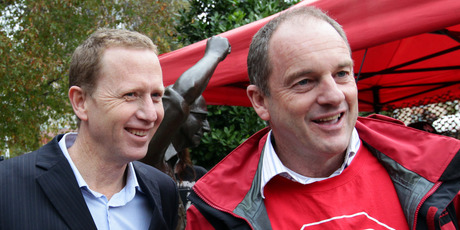Strike averted as NZ Bus and Unions reach agreement http://www.voxy.co.nz/national/strike-averted-nz-bus-and-unions-reach-agreement/5/135467
Disgraceful injury figures show health and safety policy needs to change http://www.scoop.co.nz/stories/PO1209/S00206/injury-figures-show-health-and-safety-policy-needs-to-change.htm
Shocking work death toll revealed in report http://www.stuff.co.nz/business/money/7686055/Shocking-work-death-toll-revealed-in-report
Injured workers would fill Eden Park four times over http://tvnz.co.nz/national-news/injured-workers-would-fill-eden-park-four-times-over-5085775
Historic CTU/Iwi Relationship Hui – Hui Whakawhanaungatanga http://www.scoop.co.nz/stories/PO1209/S00213/historic-ctuiwi-relationship-hui.htm
Work trials ‘adding to skills shortages’ http://www.stuff.co.nz/national/politics/7666692/Work-trials-adding-to-skills-shortages
Bullying rife in public service – survey http://www.stuff.co.nz/business/industries/7664815/Bullying-rife-in-public-service-survey
Public sector pay lags private firms http://www.stuff.co.nz/business/money/7664578/Public-sector-pay-lags-behind-private-firms
Port dispute unresolved a year on http://www.stuff.co.nz/business/industries/7671598/Port-dispute-unresolved-a-year-on
ACIL confused about their role in Port of Auckland dispute http://www.scoop.co.nz/stories/AK1209/S00276/acil-confused-about-their-role-in-port-of-auckland-dispute.htm
Port secrecy fuels Labour law bid http://www.nzherald.co.nz/nz/news/article.cfm?c_id=1&objectid=10834473
Ports of Auckland wharfie dispute hasn’t gone away http://www.nbr.co.nz/article/ports-auckland-wharfie-dispute-hasnt-gone-away-ca-128266
Auckland bus drivers vote against offer from NZ Bus http://www.firstunion.org.nz/content/auckland-bus-drivers-vote-against-offer-nz-bus-0
Organised student job scam probed http://www.nzherald.co.nz/nz/news/article.cfm?c_id=1&objectid=10832529
The online submission to support extending paid parental leave is now live and circulating! Please spread amongst your networks, Facebook pages, twitter accounts and websites – Thanks! http://www.actionstation.org.nz/campaigns/26-for-babies/submission/more-time-for-babies
Union accuses Govt of a cop-out http://www.3news.co.nz/Union-accuses-Govt-of-a-cop-out/tabid/1607/articleID/269121/Default.aspx
Spring Creek: Hundreds of jobs to go http://www.nzherald.co.nz/nz/news/article.cfm?c_id=1&objectid=10836211
EPMU: Miners to travel to Beehive to plead for jobs, communities http://www.scoop.co.nz/stories/PO1209/S00296/miners-to-travel-to-beehive-to-plead-for-jobs-communities.htm
Union Report: In this week’s episode: Issue 1 – 6% GDP with 6.8% unemployment rate, how does the economy provide the momentum to create growth and secure jobs? Issue 2 – Are safe staffing and healthy workplaces being ignored for cost cutting? Issue 3 – Does the real cost of private prisons make a mockery of the public private model?
ACC
Exit strategy: Has the ACC been on a determined campaign to “exit” long-term claimants? And does it use select doctors for its medical assessments with one principal aim – to reduce costs? http://www.tv3.co.nz/September-9th—Exit-Strategy/tabid/1343/articleID/79380/Default.aspx#ixzz26h1ElolC
ACC pays specialists $500,000 a year http://www.3news.co.nz/ACC-pays-specialists-500000-a-year/tabid/1607/articleID/269243/Default.aspx
ACC specialist stats revealed by Greens http://www.nzherald.co.nz/politics/news/article.cfm?c_id=280&objectid=10833828
Editorial: ACC assessments need independence http://www.stuff.co.nz/waikato-times/opinion/7684231/Editorial-ACC-assessments-need-independence
Winz joins ACC in firing line for ‘hatchet doctors’ http://www.stuff.co.nz/sunday-star-times/latest-edition/7686104/Winz-joins-ACC-in-firing-line-for-hatchet-doctors
NZ ECONOMY
CTU: Jobless growth http://www.scoop.co.nz/stories/PO1209/S00261/jobless-growth.htm
Peter Conway: Inequality is now at its highest level http://www.stuff.co.nz/dominion-post/comment/7688627/Inequality-is-now-at-its-highest-level
CTU secretary Peter Conway
Peter Lyons: My top ten economic contradictions and con jobs http://www.nzherald.co.nz/politics/news/article.cfm?c_id=280&objectid=10833333
Critics Gearing up for TPP round in Auckland in December http://www.scoop.co.nz/stories/PA1209/S00246/critics-already-gearing-up-for-tpp-round-in-auckland.htm
Parliamentary Services Monthly Economic Review (September) http://www.parliament.nz/NR/rdonlyres/D6DA06E8-0368-46C0-805A-CF6A90016AEF/241896/Sep13.pdf
A ‘Dear John’ letter on trade http://www.stuff.co.nz/auckland/local-news/local-blogs/off-pat/7694565/A-Dear-John-letter-on-trade
Deborah Gleeson: US proposal on Pharmac a bitter pill http://www.nzherald.co.nz/nz/news/article.cfm?c_id=1&objectid=10836007
CTU: Highest Ever Loss of Kiwis to Australia http://www.scoop.co.nz/stories/PO1209/S00276/highest-ever-loss-of-kiwis-to-australia.htm
POVERTY & WELFARE DEBATE
Thousands of Kiwi children living in poverty http://tvnz.co.nz/national-news/thousands-kiwi-children-living-in-poverty-5099909
Blame game won’t prevent poverty http://www.stuff.co.nz/the-press/opinion/columnists/chris-trotter/7724070/Blame-game-won-t-prevent-poverty
Welfare protest – back to the cells by Sue Bradford http://www.pundit.co.nz/content/welfare-protest-back-to-the-cells
Gordon Campbell on Paula Bennett’s yawning credibility gap http://gordoncampbell.scoop.co.nz/2012/09/24/gordon-campbell-on-paula-bennetts-yawning-credibility-gap/
Precious little sense on Planet Paula By Tapu Misa http://www.nzherald.co.nz/opinion/news/article.cfm?c_id=466&objectid=10834480
Latest reforms an atrocious attack on NZ’s most vulnerable http://www.scoop.co.nz/stories/PO1209/S00224/latest-reforms-an-atrocious-attack-on-nzs-most-vulnerable.htm
Gordon Campbell on Paula Bennett’s latest welfare plans and Labour’s exchange rate cynicism http://gordoncampbell.scoop.co.nz/2012/09/12/gordon-campbell-on-paula-bennetts-latest-welfare-plans-and-labours-exchange-rate-cynicism/
Poverty group slams sanctions for beneficiaries http://tvnz.co.nz/national-news/poverty-group-slams-sanctions-beneficiaries-5075347
Lunchbox differences in decile 1 and decile 10 schools http://www.3news.co.nz/Lunchbox-differences-in-decile-1-and-decile-10-schools/tabid/367/articleID/269617/Default.aspx
Take a step to end child poverty By Metiria Tūrei http://www.radiolive.co.nz/Take-a-step-to-end-child-poverty/tabid/721/articleID/30738/Default.aspx
‘One strike’ rule for beneficiaries http://www.nzherald.co.nz/politics/news/article.cfm?c_id=280&objectid=10834762
Gareth Morgan: Benefit tightening won’t reduce unemployment http://www.nzherald.co.nz/opinion/news/article.cfm?c_id=466&objectid=10836003
Hunger strike goes on http://www.nzherald.co.nz/nz/news/article.cfm?c_id=1&objectid=10835932
NZCCSS Policy Watch September 2012 http://christiansocialservices.blogspot.co.nz/
Welfare ‘reform’ – Paula Bennett’s 143-page second welfare changes bill is out – with a nasty added sting in the tail. http://thestandard.org.nz/welfare-reform/
Arrests at Auckland protest over benefit plans http://www.stuff.co.nz/national/politics/7696512/Arrests-at-Auckland-protest-over-benefit-plans






















